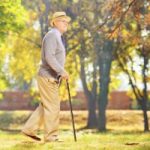 Walking exercise could be a new prescription in the fight against fatigue associated with rheumatoid arthritis.
Walking exercise could be a new prescription in the fight against fatigue associated with rheumatoid arthritis.
Like pain, fatigue is a symptom that can appear with many different diseases, rheumatoid arthritis is one of those diseases. Fatigue is best described as an overwhelming feeling of exhaustion both physically and mentally. Chronic fatigue is constant tiredness that is not associated with activity or overexerting yourself and it does not disappear with rest.
Advertisement
People with different types of arthritis can experience chronic fatigue, but is can be particularly intense with rheumatoid arthritis. When extreme fatigue with rheumatoid arthritis strikes it can make your limbs feel heavy, you feel a flu- like exhaustion and you might feel as if your energy has been drained away.
Rheumatoid arthritis tiredness or fatigue can have a huge impact on a person’s life so people who suffer from it are always looking for ways to cope.
New study suggests adding more steps to your day will lower fatigue in RA
It may seem natural to want to avoid physical activity when you feel fatigue however; researchers at the University of California in San Francisco discovered that walking exercise can lower fatigue that is associated rheumatoid arthritis (RA).
Researchers worked with close to 100 sedentary RA sufferers with at least a moderate level of fatigue. They had been diagnosed with the disease an average of 14 years. Each filled out a health questionnaire and had to report on their fatigue level. Once the questionnaire was complete, they were asked to wear an activity-monitoring device, called a pedometer, for one week to determine their base level of activity. The average number of steps was 3,710. This number is well below what is considered the sedentary level.
The participants were divided into three different groups and given different walking and reporting instructions; some were told to keep a step diary. At the end of the 2-week program all groups experienced a decrease in fatigue the more they moved. It is interesting to note, those who were the most sedentary at the beginning of the experiment experienced the biggest change in fatigue level at the end.
You can find a pedometer at many local sporting goods or electronic stores. There are also various pedometer apps available so as long as you have your cell phone with you when you walk, you are good to go.
Common causes of fatigue in RA
Rheumatoid arthritis exhaustion is not unusual. An overwhelming 98 percent of those who suffer from RA also experience fatigue. While each person is different, it’s believed that a number of factors can cause fatigue in those who suffer from the arthritic condition.
Chronic pain of any kind can cause tiredness. Also, pain and discomfort due to sore or swollen joints can keep an RA sufferer awake at night. Insomnia, of course, leads to fatigue. We also have to keep in mind that when someone is suffering from a chronic disease it can lead to depression – fatigue has long been associated with depression.
Other RA fatigue triggers include the following:
- Medications – some medications can cause drowsiness, which can contribute to fatigue.
- Inflammation – autoimmune diseases like RA can cause a lot of inflammation, which in turn can result in fatigue.
- Anemia – this is when you don’t have enough red blood cells. It happens a lot with RA patients and causes muscles to get tired faster.
- Loss of muscle mass – in some cases RA sufferers are affected by a condition where the muscle mass decreases and fatigue increases.
Lifestyle changes to manage fatigue in RA
As suggested by the University of California study, regular exercise can help people manage the fatigue associated with rheumatoid arthritis. In fact, the authors of the study say exercise not only reduces fatigue, it improves mood, may help patients maintain a healthier weight, and may improve cardiovascular functioning.
Eating well is also important if you want to manage rheumatoid arthritis tiredness. Consuming fruits, vegetables, nuts and whole grains will help give the body the energy it needs. It’s important to remember to include protein, along with some carbohydrates. As well, don’t skip breakfast.
Supporting joints can lessen fatigue, too. One way to approach this is to wear a brace once in a while or rely on a cane to help take some of the stress off joints and muscles. Lastly, make sure you maintain good sleep habits. You can do this by going to bed at the same time every night and following the same bedtime routine. That could mean taking a warm bath, reading for a few minutes, meditating or listening to music.
Coping with chronic fatigue in rheumatoid arthritis
Extreme fatigue with rheumatoid arthritis can be frustrating, but there are steps sufferers can take to help them cope better. One suggestion is to plan activities a little later than what you normally would so that you can get a couple extra hours sleep. This just might enable you to have the energy you need to get through all the activities and tasks of the day. You can also consider an afternoon rest period.
If walking exercise doesn’t sound appealing, consider this…recent studies show that people with arthritis benefit from the practice of yoga. Researchers indicate that it helps reduce joint pain, improve joint flexibility, joint function; and it lowers stress.
Swimming and cycling have are also forms of exercise that many people with RA report improves their joint functioning and level of fatigue.
Advertisement
When you suffer from RA planning your day takes a little more thought, if you want to try to control fatigue. For instance, if you take the time to decide which activities are your top priorities and save your peak times of the day to accomplish those, you will feel more productive at the end of the day. You may have to turn down some other things that you may want to do, but you can still accomplish what matters the most by being selective.
There is RA fatigue treatment. It’s something patients can discuss with their doctor once the cause of the exhaustion has been determined. If anemia is a factor, you might be prescribed iron treatments or hormone treatment. There is also a possibility that you could receive medications specific to increasing energy. This could include treatments that reduce sleepiness brought on by insomnia. Sometimes RA fatigue treatment will involve exercise and cognitive behavior therapy.
It’s important to remember that you can draw on the energy of those around you too. Your family and friends are your support system and can help you on those days when you are zapped of energy.
